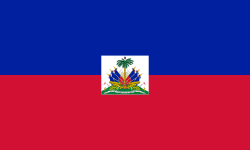HAITI
Society

Society
Society
State structure and politics
Haiti is a country of coups and dictators. Traditionally, a great deal of power is concentrated in the hands of the president. Many try to gain and retain this power by all means, including violence. Many presidents went on to self-enrich and tried to stay in power longer than legally permitted. Race is an important factor in politics. The presidency alternates between mulattos and blacks.
Haiti is an example of a failed state, in which the government plays only a small role and does not control the entire territory. The government is inefficient and partly corrupt. Haiti is one of the most corrupt countries in the world according to the corruption index. The army was involved in many coups, but was disbanded in 1995. The police and judiciary function poorly, making room for human rights violations, drug trafficking, gangs and kidnappings. The UN peacekeeping force Minustah has contributed to a slight improvement in the situation. The international community is pressing for the construction of state structures and the rule of law. The country has little democratic experience and democracy is difficult to establish.
The current political situation is described in the history section.
Economy
Haiti is the poorest country in the Western Hemisphere and one of the poorest countries on earth. GDP per capita is $1,800 per year (2017). Due to decades of violence, unrest and natural disasters, the country has hardly seen any economic development. The gap between rich and poor is huge. At least four hundred thousand children work as slaves; they are called restaveks. There is a very high unemployment rate of around 40%. (2017) A large part of the population works in agriculture; there is little industry. Most of the population works in the service sector. Due to massive deforestation and unsustainable farming practices, large parts of the countryside are threatened by erosion and desertification. Domestic agricultural production is declining and being replaced by cheaper imports. The country's infrastructure is very poor. The US is by far the most important trading partner. Haiti is heavily dependent on loans and gifts from abroad and lives mainly from what emigrated Haitians send back to their homeland. The country has many foreign debts. The once flourishing tourism is almost non-existent because of the unrest in the country.
Half of the population lives and works in the countryside. Agricultural production is small-scale and farmers barely grow enough to meet their own needs. The main products are sugar cane, coffee and cocoa. The banana plantations are somewhat larger, but the modest profits disappear into the pockets of the American multinational. Even the profits from fishing are well below par, while the surrounding waters are rich in fish.
Sources
Elmar Landeninformatie
Wikipedia
CIA - World Factbook
BBC - Country Profiles
Copyright: Team The World of Info